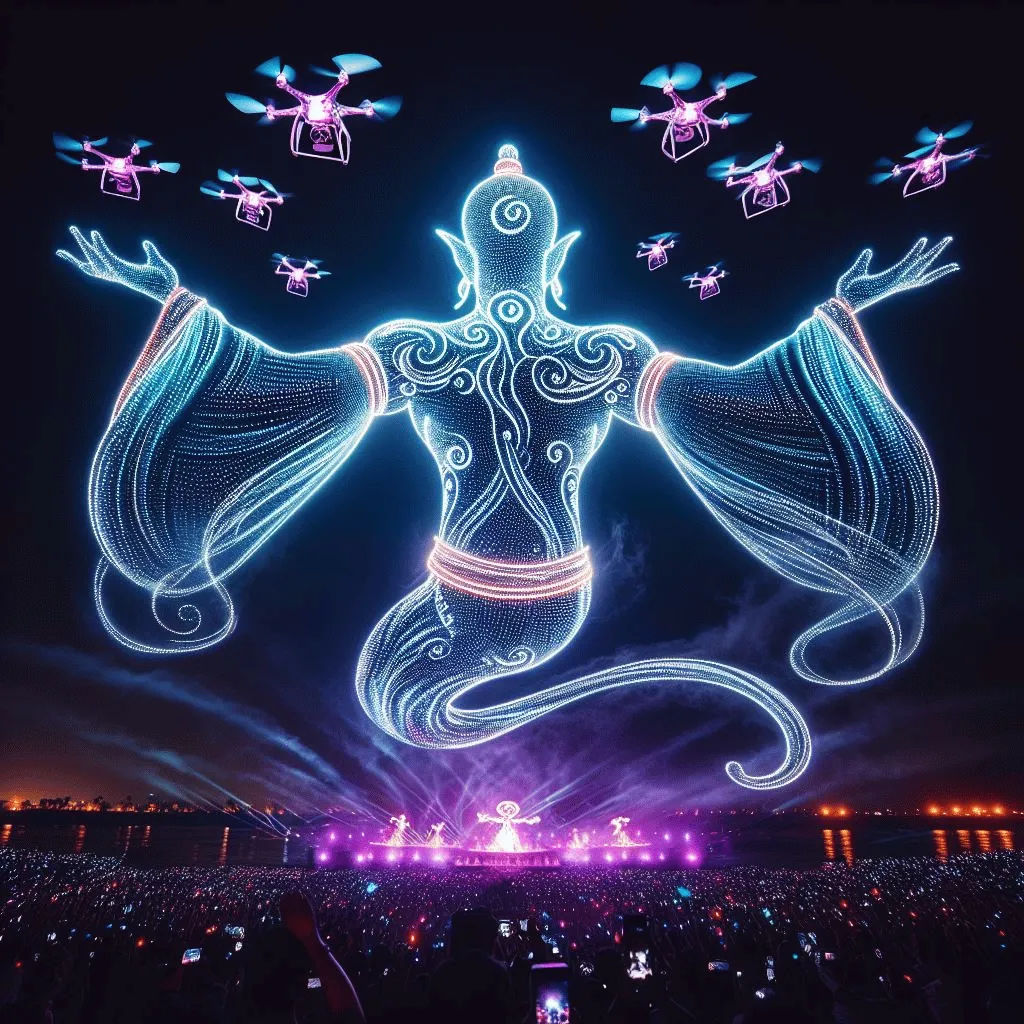How to Start a Drone Show Business? (Requirements and Cost)

Are you ready to take your love for drones to new heights? Starting a drone show business can be an exhilarating and profitable venture.
With the popularity of drones skyrocketing (pun intended), there has never been a better time to dive into this exciting industry.
But before you launch your drone fleet into the skies, there are a few key steps you need to take to ensure a smooth takeoff.
From acquiring the right equipment to navigating legal requirements, this guide will provide you with all the essential information you need to kickstart your drone show business.
What is drone show and how does it work?
Let me tell you how a drone light show works and what is it.
What is a Drone Show?
A drone show is a synchronized performance of multiple drones, choreographed to create stunning aerial displays. These shows combine the precision of technology with the creativity of human imagination, resulting in a visual extravaganza that leaves audiences in awe.
How Does It Work?
Drone shows rely on a combination of innovative technology and meticulous planning. Here’s a simplified breakdown of the process:
Read More: How Drone Light Shows Work? (May 2023)
From sporting events to music festivals and celebrations, drone shows have become a popular form of entertainment. With their ability to create intricate designs and captivating movements, these aerial performances have revolutionized the way we experience live events.
So, the next time you see a swarm of drones painting the night sky with their dazzling display, remember the meticulous planning and technological wizardry that goes into creating this breathtaking spectacle.

How to start a drone show business?
Starting a drone show business can be an exciting and rewarding venture, but it requires careful planning and execution. Here are the key steps you need to take:
1. Research the industry:
Learn about the drone show market: Understand the current trends, competition, and potential challenges.
Analyze regulations and licensing requirements: Drone shows are subject to aviation regulations, so ensure you comply with all necessary permits and licenses.
Research the latest drone technology: Familiarize yourself with different drone models, software programs, and other equipment needed for professional drone shows.
2. Develop a business plan:
Define your target market: Identify specific events, industries, or organizations that would benefit from drone shows.
Create a unique value proposition: Differentiate yourself from competitors by focusing on specific offerings, innovative concepts, or competitive pricing.
Outline your financial resources: Estimate the costs of equipment, software, personnel, insurance, and marketing, and develop a solid financial plan.
3. Invest in equipment and software:
Purchase high-quality drones: Choose drones suitable for the scale and complexity of your desired shows.
Invest in specialized software: Drone show software is crucial for programming flight paths, controlling lights, and coordinating the entire performance.
Get the necessary accessories: Consider spare batteries, charging equipment, safety gear, and transportation cases.

Read More: How to Make Money With a Drone? (17 Best Ways)
4. Build a skilled team:
Recruit experienced drone pilots: Look for pilots with strong flying skills, knowledge of aviation regulations, and experience in drone shows.
Hire creative individuals: Consider designers, animators, and programmers to assist with show design and software management.
Build a network of collaborators: Partner with event organizers, marketing agencies, and other businesses to expand your reach and potential clients.
5. Market your services effectively:
Develop a strong brand identity: Create a professional website, portfolio, and social media presence showcasing your skills and experience.
Network with potential clients: Attend industry events, conferences, and trade shows to connect with event organizers and businesses interested in drone shows.
Develop effective marketing campaigns: Utilize various online and offline channels to reach your target audience and promote your services.
Additional resources:
Remember, starting a successful drone show business requires dedication, hard work, and continuous learning.
By following these steps and remaining adaptable to the evolving industry, you can establish your business and become a leader in the captivating world of drone shows.

What are the requirements to start a drone show business?
The requirements to start a drone show business can be categorized into three main areas: legal, technical, and operational.
Legal requirements:
Remote Pilot Certificate (RPC) from the Federal Aviation Administration (FAA): All drone pilots involved in commercial operations, including drone shows, must hold a valid Part 107 Remote Pilot Certificate.
FAA Operational Approval (FAA Part 107 Waiver): Depending on the specific location, size, and complexity of your drone show, you may need to obtain an FAA waiver to operate beyond the standard Part 107 regulations.
Local permits and licenses: Check with your local authorities for any additional permits or licenses required for operating drones in your area.
Insurance: Obtain liability insurance to cover any potential risks associated with operating drones.
Technical requirements:
High-quality drones: Invest in drones specifically designed for professional drone shows. These drones should be reliable, stable in flight, and capable of carrying the weight of LED lights.
Drone show software: Specialized software is essential for programming flight paths, controlling lights, and coordinating the entire show. Popular options include Drone Show Software, Lightware Swarm, and UgCS.
LED lights: Choose bright and versatile LED lights that can be programmed to display various colors, patterns, and animations.
Ground control station (GCS): A GCS allows pilots to monitor the drones and control the show in real-time.
Backup equipment: Have spare batteries, chargers, and other essential equipment readily available to address any technical issues.

Operational requirements:
Experienced drone pilots: Your team should consist of experienced drone pilots with a strong understanding of aviation regulations, drone safety, and emergency procedures.
Creative professionals: Consider hiring designers, animators, and programmers to assist with show design, animation creation, and software management.
Logistics and transportation: Develop efficient logistics for transporting drones, equipment, and personnel to various show locations.
Risk management plan: Implement a comprehensive risk management plan to identify potential risks and develop strategies to mitigate them.
Marketing and sales: Develop a strong marketing plan to target potential clients and promote your drone show services effectively.
Additional requirements:
Financial resources: Starting a drone show business requires significant investment in equipment, software, personnel, and insurance.
Business plan: Develop a comprehensive business plan outlining your target market, competitive analysis, financial projections, and marketing strategies.
Network and collaborations: Build relationships with event organizers, businesses, and other professionals in the drone industry to expand your network and potential client base.
Note: Specific requirements may vary depending on your location and the scope of your drone show business. Always stay updated on the latest regulations and industry standards.

How many drones are required for a drone show business?
Running a drone show business involves a few key considerations. First and foremost is the scale and complexity of your shows. If you’re planning smaller events with simpler designs, 50 to 100 drones should suffice.
For more intricate formations and animations in medium-scale shows, consider using 100 to 300 drones. To achieve truly spectacular displays in large-scale events, you’ll need 300 drones or more.
The desired visual impact also plays a role in determining the number of drones. Using more drones creates a brighter and more vivid display, while fewer drones can still be effective for smaller events or simpler designs.
Your budget is another critical factor. Drones are a significant investment, so the number you acquire will depend on your financial resources. If purchasing a large fleet is not feasible, consider renting or leasing drones.
In general, here are some guidelines to keep in mind:
To make informed decisions, it’s crucial to consult with experienced drone show professionals. They can help assess your specific needs, recommend the best equipment, and provide guidance on achieving your desired results.
So, before taking flight, connect with the experts to ensure your drone show business soars to new heights.
How much price you should set for your drone show business?
Running a drone show business involves navigating through various considerations to determine the right pricing strategy. Let’s break down the key factors that play a crucial role:
Cost Factors:
Market Factors:
Pricing Strategies:
Additional Considerations:
Resources for Help:
In determining your pricing, carefully analyze costs, research the market, and choose a strategy that reflects the value of your drone show services.
The goal is to set a price point that attracts clients, ensuring the success and sustainability of your business.

How much does it cost to start a drone show business?
The cost of starting a drone show business can vary greatly depending on several factors, including:
Scale and complexity of your operation:
Equipment:
Other costs:
Remember, these are just general estimates. The final cost of starting your drone show business will depend on your specific goals, operational needs, and chosen equipment.
It’s crucial to create a detailed business plan and financial projections to accurately estimate your startup costs and ensure the financial viability of your venture.

How much profitable drone show business is?
The profitability of a drone show business depends on various factors, making it a dynamic venture. One key aspect is the scale and complexity of your shows.
Generally, larger and more intricate displays have higher profit potential compared to smaller, simpler ones.
Your pricing strategy plays a pivotal role. While charging premium prices can boost profits, it’s essential to strike a balance to remain competitive in the market.
Operational efficiency is another critical factor. Managing costs, optimizing logistics, and minimizing downtime can significantly impact your bottom line.
Consider the market demand in your region. Operating in an area with high demand for drone shows and limited competition can contribute to greater profitability.
Additionally, exploring additional revenue streams such as sponsorships and merchandise sales can further enhance profits.
In terms of profitability estimates:
These are general estimates, and actual profits may vary based on the factors mentioned earlier.
To delve deeper into the profitability landscape, check out resources like Market Research Intellect and My Drone Services.
Starting a profitable drone show business requires careful planning and strategic execution. Focus on delivering high-quality shows, building strong client relationships, and optimizing operations to maximize profitability.
Thorough research, a solid business plan, and understanding associated risks are crucial before investing in this exciting field.

What are the advantages and disadvantages of starting a drone show business?
So, you’ve caught the drone fever and you’re considering turning your passion into a profitable business venture? Well, strap in, because the sky’s the limit! Here are some advantages of starting a drone show business:
Advantages of starting a drone show business:
High demand and growing market: Drone shows are increasingly popular for various events and occasions, with demand expected to grow significantly in the coming years.
High-profit potential: These shows can be lucrative, especially for large-scale productions or those with unique features and designs.
Low barriers to entry: While some investment is required, starting a drone show business doesn’t require significant capital compared to other businesses.
Scalability: You can start small and gradually expand your business as you acquire more equipment and experience.
Creativity and innovation: This field allows for artistic expression and innovation in design, animation, and technology.
Environmentally friendly: Drone shows offer a sustainable alternative to traditional fireworks, reducing air and noise pollution.
Unique and captivating experience: Drone shows provide a mesmerizing and unforgettable experience for audiences, making them a valuable addition to various events.
Networking opportunities: You can connect with event organizers, businesses, and other professionals in the industry, expanding your network and potential client base.

Disadvantages of starting a drone show business:
Competition: The drone show market is becoming increasingly competitive, requiring effective marketing and differentiation strategies.
Regulations and permits: Operating drones requires compliance with various regulations and obtaining necessary permits, which can be complex and time-consuming.
High initial investment: While the entry barrier is lower than some, purchasing drones, software, and other equipment still requires significant upfront investment.
Technical expertise: Operating and maintaining drone technology requires specialized knowledge and skills, necessitating training and ongoing learning.
Weather dependent: Shows can be canceled or impacted by adverse weather conditions, leading to lost revenue and potential customer dissatisfaction.
Safety concerns: Operating drones safely requires vigilance, risk management strategies, and comprehensive insurance coverage.
Logistical challenges: Transporting equipment, personnel, and drones to various show locations can be complex and costly, especially for large-scale operations.
Limited show duration: Drone shows typically last for a short period, requiring efficient setup and breakdown processes to maximize profitability.
Overall, starting a drone show business offers exciting opportunities for entrepreneurs with a passion for technology and creativity.
However, it’s crucial to carefully consider the advantages and disadvantages, research the market, and develop a solid business plan before embarking on this venture.

How to promote my drone show business?
Promoting your drone show business effectively requires a multi-pronged approach to reach your target audience and generate interest in your services. Here are some key strategies to consider:
Digital Marketing:
Website: Craft a polished website that elegantly displays your portfolio, services, pricing, testimonials, and contact information.
Guarantee that your site is not only mobile-friendly but also finely tuned for optimal search engine performance.
Social Media: Build a strong presence on platforms like Instagram, Facebook, and YouTube. Regularly post captivating content, including show photos and videos, behind-the-scenes glimpses, and client testimonials.
Engage with your audience, respond to comments and questions, and run targeted ad campaigns.
Content Marketing: Create blog posts, articles, and videos about drone shows, their benefits, and your unique offerings. Share your expertise, showcase your creativity, and provide valuable information to potential clients.
Email Marketing: Build an email list and send out newsletters with updates, promotions, exclusive offers, and event announcements. Segment your list for targeted campaigns and personalize your messages for better engagement.

Offline Marketing:
Networking: Attend industry events, trade shows, conferences, and local business gatherings to connect with potential clients, partners, and event organizers. Build relationships and promote your services directly.
Public Relations: Reach out to local media outlets, bloggers, and influencers to generate publicity and coverage for your business. This can include press releases, interviews, and featured articles about your drone show offerings.
Partnerships: Collaborate with other businesses, event organizers, and creative professionals to offer bundled services, cross-promotions, and joint marketing initiatives.
Sponsorships: Sponsor relevant events, festivals, and local initiatives to increase brand awareness and visibility. This can also provide opportunities for showcasing your drone shows and engaging with potential clients.

Additional Strategies:
Testimonials and case studies: Showcase successful past projects and positive client testimonials on your website and marketing materials to build trust and credibility.
Create a referral program: Encourage existing clients to refer their friends and colleagues by offering discounts or other incentives.
Offer free consultations: Provide potential clients with free consultations to discuss their needs, answer questions, and demonstrate your expertise.
Run contests and giveaways: Utilize social media contests and giveaways to increase engagement, attract new followers, and generate publicity.
Track and analyze your results: Utilize analytics tools to measure the effectiveness of your marketing efforts and make data-driven decisions to optimize your campaigns and maximize your ROI.
By implementing a combination of these strategies and tailoring them to your specific target audience and budget, you can effectively promote your drone show business and attract clients to your captivating light shows. Remember, consistency and creativity are key to standing out in this competitive industry.

Final Thoughts – How to Start a Drone Show Business?
Starting a drone show business is an exciting venture with significant potential for creativity, innovation, and profitability.
However, it’s crucial to approach this venture with careful planning, comprehensive research, and a solid understanding of the industry.
By considering the factors discussed in this article, including the legal requirements, technical needs, operational considerations, pricing strategies, and promotion techniques, you can equip yourself with the knowledge and tools necessary to launch and grow a successful drone show business.
Remember, the key to success lies in delivering high-quality shows, consistently exceeding customer expectations, and adapting to the evolving dynamics of this dynamic industry.
With dedication, passion, and a strategic approach, you can transform your dream of captivating audiences with mesmerizing drone shows into a thriving reality.
FAQs
While technically possible, using your own drones for a professional drone show is not recommended. Certified show drones offer specialized features and stability for safe and precise performances. Additionally, operating multiple drones simultaneously requires advanced software and expertise.
Yes, most drone shows require specific permits and authorizations from aviation authorities. The exact regulations vary depending on your location and the complexity of the show. It’s crucial to consult with local authorities and obtain necessary permits before operating.
Safety is paramount in drone shows. Comprehensive risk assessments, trained pilots, clear airspace, and weather monitoring are essential to ensure the safety of the audience, performers, and surrounding areas.
Absolutely! Drone shows offer extensive customization options. You can design your own formations, animations, and light displays to create a truly unique and personalized experience for your event.
The future of drone shows is bright, with advancements in technology like swarm intelligence, increased automation, and larger scale productions. We can expect even more intricate displays, interactive experiences, and integration with other technologies for truly captivating and immersive entertainment.







